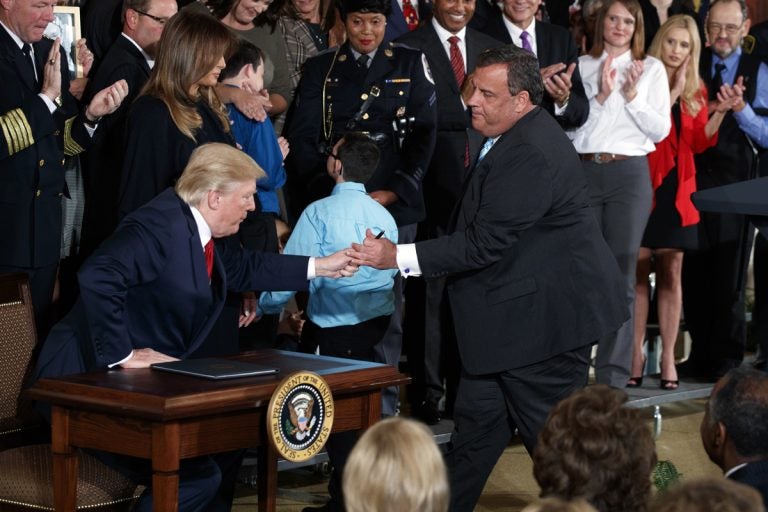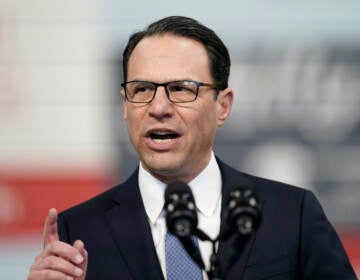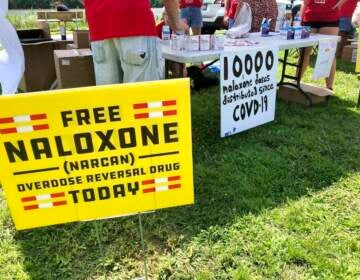Legislative prescriptions targeting opioid crisis accompany Trump declaration
Representatives from Delaware, New Jersey and Pennsylvania offers bills addressing fentanyl smuggling, medical education and greater regional cooperation.
Listen 5:05
President Donald Trump hands a pen to New Jersey Gov. Chris Christie after signing a presidential memorandum to declare the opioid crisis a national public health emergency in the East Room of the White House, Thursday, Oct. 26, 2017, in Washington. (Evan Vucci/AP Photo)
Last week, President Donald Trump declared the nation’s opioid crisis a national health emergency. Though he has many critics, the president has been praised for focusing a national spotlight on the accelerating rates of death and despair brought about by addiction.
“We think that an emergency declaration is important, in part, because it frees up resources, it cuts some red tape, and allows the president to take action,” said U.S. Rep. Tom MacArthur, a South Jersey Republican.
For example, with the declaration, Trump may be able to increase the number of beds available to people with addiction, getting treatment to them faster than before, said MacArthur, a leader on the bipartisan Heroin Task Force.
South Jersey Congressman Donald Norcross, a Democrat, and Bucks County Republican Congressman Brian Fitzpatrick are also on the task force that has successfully ushered the INTERDICT Act through the House.
Fitzpatrick, a former FBI agent, said the measure is focused on stopping fentanyl and other synthetic opioids from sneaking by customs and border patrol agents.
It gives “our customs officers, our border patrol agents, the chemical screening equipment that they need, at all points of entry to detect packages that may contain this, because a lot of the OD deaths are from fentanyl-laced heroin,” he said.
The group is pushing a total of six bills addressing issues that range from addiction recovery to synthetic drugs.
Fitzpatrick recently had a stack of cards in his pockets to hand out to his House colleagues with detailed information on an opioid-related bill. Half were for him for distribution to Republicans, and half were for his Democratic partner, Congresswoman Stephanie Murphy of Florida.
“I have a stack of cards for her to give out to her colleagues, I have a stack I’m going to give out to my colleagues,” he said. “The legislative director’s information explains the bill on the front, and all the supporting organizations are on the back. The way we get things like this across the finish line is to get enough co-sponsors on board, where you build enough critical mass that forces leadership to put it on the House floor for all for a full floor vote.”
Nationwide, more than 59,000 people died from overdoses last year.
Calling for legislation coupled with compassion
Fitzpatrick said lawmakers need to show compassion when dealing with the crisis.
“The real travesty, one of the many travesties with this epidemic, is that nine times out of 10, it’s starting in people’s medicine cabinets in their homes, almost invariably, almost without exception,” he said.
In Delaware, it’s a different problem altogether. Congresswoman Lisa Blunt Rochester, a Democrat, said it’s important for officials in the region to coordinate across state lines.
“One of the big issues for us is that Delaware is so small, it’s hard for us to think of trying to tackle something like this on our own, so we partnered with New Jersey and Pennsylvania — myself and the other Congress members — to even write a letter to say, ‘We need the support to be able to share the information with our doctors, if they are giving out prescriptions, so that people who might jump from state to state, because we’re in such close proximity, don’t take advantage of that close proximity.”
Blunt Rochester has introduced a bill called the CRIB Act — it focuses on the sad reality of babies born addicted to opioids.
“That is really the focus of it, to look at those babies that may be born addicted … how do we address that, as well. But I think it’s a community-wide issue, it’s a family-wide issue, and it’s a public health issue. And I think that’s probably one of the biggest takeaways that we want people to realize, is that this impacts our economy as well.”
Norcross, the other Democratic leader of the Heroin Task Force, is pushing a bill demanding medical schools spend more time training future doctors on opioid abuse.
“Four hours of education and four years of medical school are clearly not enough,” he said. “With 65,000 people dying each year, there is a problem that’s not being addressed. So we’re going to work with [medical schools] to address that issue.”
But Norcoss said the medical community doesn’t carry all the blame for overprescribing medications.
“We, as a whole, are all to blame here,” he said. “It’s not about assessing blame here, it’s about how do we get over this medical condition, so that our young men and women, old men and women [and] children aren’t dying.”
While the president is using his bully pulpit to put the opioid crisis in the spotlight, his emergency declaration doesn’t come with much in the way of additional funding. Many lawmakers from the Delaware Valley region say if the nation is going to cut the daily rate of 175 overdose deaths, the fight will require billions of dollars in new funding.
And there’s no consensus yet on other spending reductions to make that possible.
WHYY is your source for fact-based, in-depth journalism and information. As a nonprofit organization, we rely on financial support from readers like you. Please give today.




